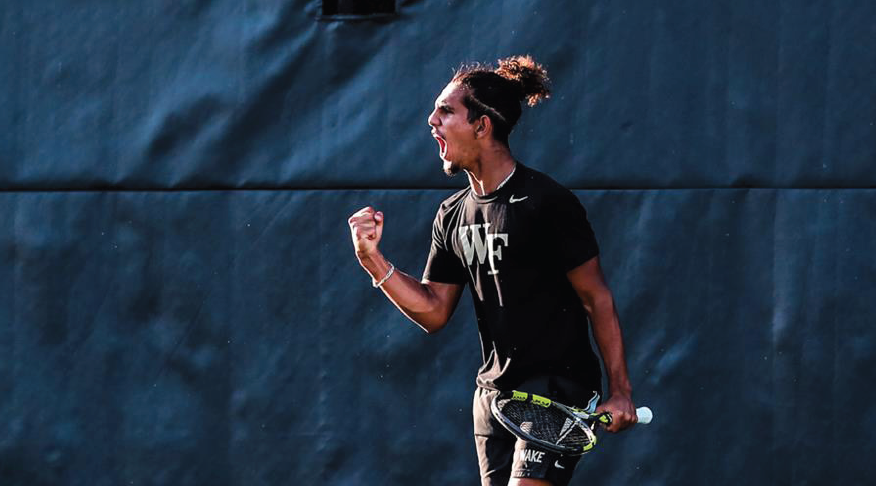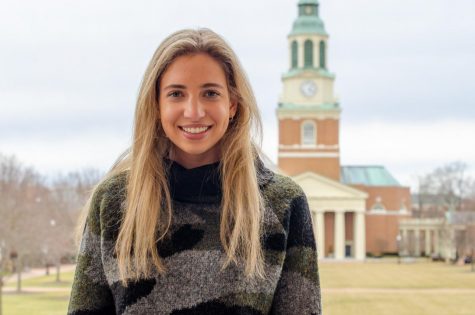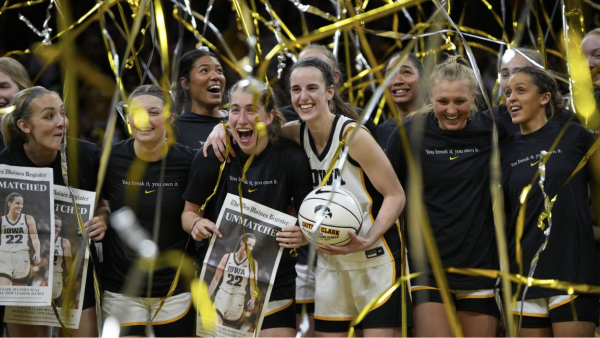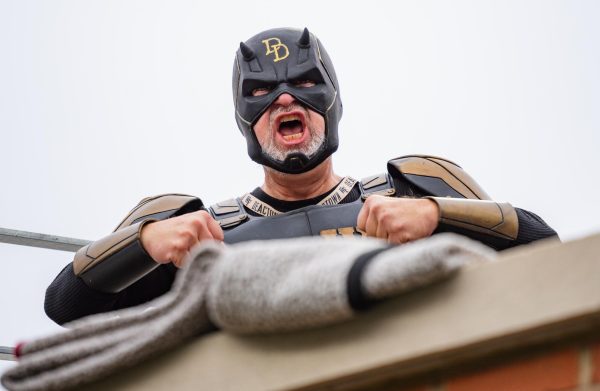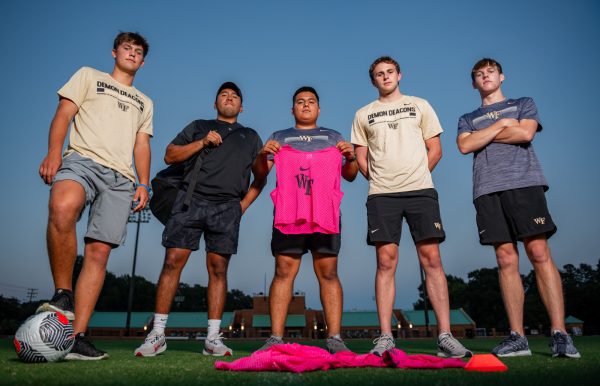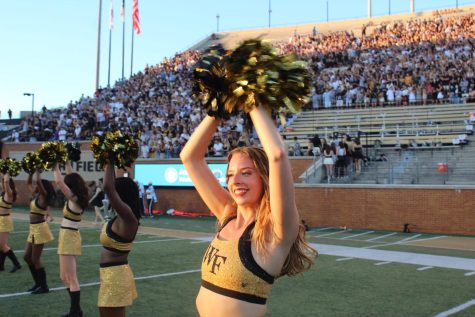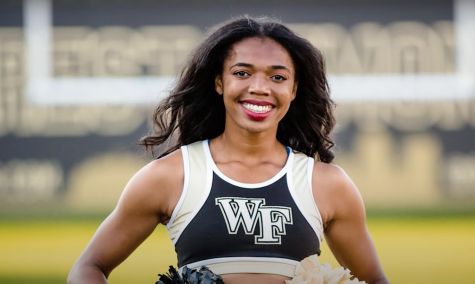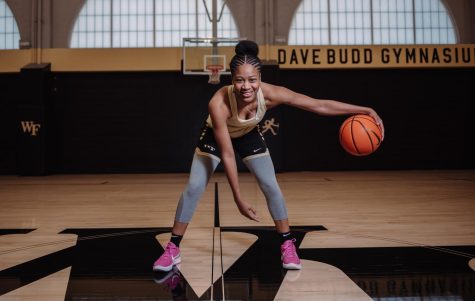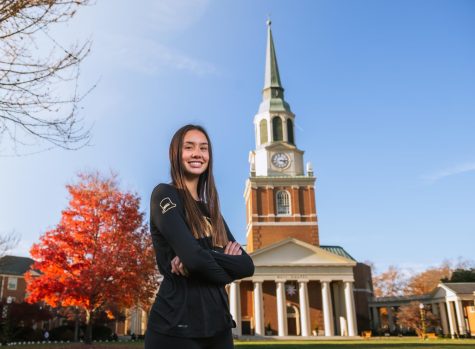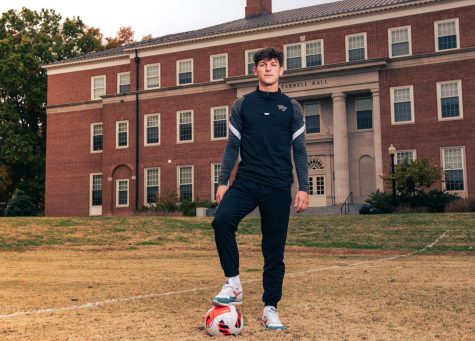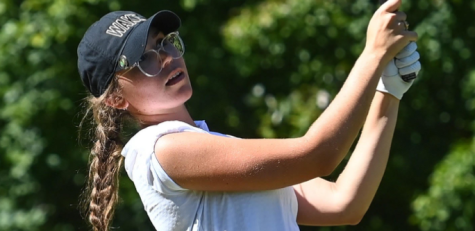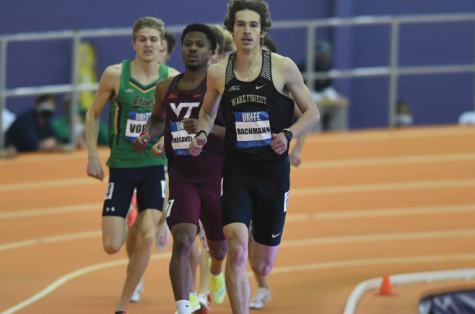Deacon “Sportlight”: Taha Baadi
Courtesy of Wake Forest Athletics
Baadi and the rest of the tennis team are set to play Virginia Tech away on Friday.
March 24, 2022
As the season progresses, Taha Baadi, a junior on the men’s tennis team, is zoned in on one final goal: redemption. The Montreal, Canada native came a long way from home in the spring of 2020 only to have his season shortened due to the COVID-19 pandemic. Now, two years later, Baadi has hit his stride as his consistency has proven to be an asset to the team.
So far during the 2022 season, Baadi has accrued nine wins in comparison to six losses at positions ranging from No. 2 to No. 6 singles. With the ACC and NCAA tournaments a month away, he and the rest of the team are gearing up for a comeback after falling short last season. While Baadi is currently concentrating on playing well in these tournaments to assist his team, a strong performance would further propel his chances at a successful career playing professionally after his time as a Demon Deacon.
Christina DeNovio: When did you start playing tennis? Did you play other sports growing up?
Taha Baadi: I first started playing tennis when I was eight. Before that, I was playing soccer. I was playing soccer and tennis until I was 12, but then I had to make the decision to pick a sport. I decided to pick tennis because I liked the individual aspect of it, and I just began to like it more.
CD: Did you have a favorite tennis player growing up?
TB: It was always Roger Federer. The first ever tennis match that I watched was Federer against Andy Roddick at Wimbledon. I was watching with my dad, and that’s when I told him I wanted to try it out.
We bought some cheap rackets, and we started playing in a random park. Then, I got more and more interested in the sport, and that’s how I got into it. Federer was definitely a player who inspired me to play tennis.
CD: How did you choose Wake Forest?
TB: In tennis, you have until you’re 18 to decide if you want to play professionally or if you want to go to college and then try playing professionally after. So during my last year of junior tennis, I was playing a lot of tournaments, and I was getting recruited by some schools. Wake Forest was just coming off an NCAA title and was No. 1 in the country.
I picked them because I thought they were the best team in the country, and I really clicked with the coaches. I didn’t even know about Wake Forest before speaking to the coaches. They told me how it was a small school and that the campus was very nice. I came to visit it, and I liked it. I liked the fact that it was small and that a lot of people knew each other and that you can build relationships with others.
CD: Have you noticed if players from different countries have different styles of play? How would you compare these styles to your own?
TB: We only have four Americans on the team out of the 18 guys. Everyone is from everywhere in the world. In tennis, depending on where you’re from, you’re taught to play a different style of tennis. For example, Luciano Tacchi is from Argentina, and the way they play over there is by making the rallies very long. They try to make the match as physical as possible.
On the other hand, players from North America — let’s say Canada or the United States — play very aggressive tennis. They try to end the rally as quickly as possible, and they try to hit as hard as possible.
It’s fun to have players from different countries so you can get different game styles all mixed together. That makes great practice. We definitely can notice the change of game styles depending on where the guys are from.
CD: How many different places have you lived in? Is there a nationality that you identify with the most, or is it equally distributed ?
TB: I was born in Morocco, and I have a Moroccan nationality. Also, I live in Canada, and I play for Canada. When I play in an international tournament, I play for the Canadian flag. Obviously, now I’m living in the United States.
I would say that when it comes to tennis, Canada has done the most for me — they’ve paid for a lot of my stuff, especially in juniors. I like representing the country — I think I owe them. I just like to say I have a mixed culture. I don’t feel more associated with one than the others. I have the Moroccan in me, the Canadian in me and now a little bit of American. It’s a good combo.
CD: What’s your favorite part of being on the tennis team?
TB: The fact that we’re probably the most diverse team at Wake Forest. We literally have teammates from all over the place. These are going to be friendships that are going to last forever, hopefully. And it’s so fun to meet so many guys from different places, build connections and get to know their cultures and perspectives. We get to form very interesting relationships because everyone is so different. But we all get along so well, which is fascinating.
CD: Do you prefer doubles or singles?
TB: Singles. I don’t like doubles all that much, honestly. If you’re playing with your best friend, it’s kind of fun, but I’d rather play singles, for sure.
CD: How do you prepare on match day?
TB: I don’t have any superstitions — I just like to get a good meal before the match. I like to listen to some good music, nothing too crazy. I’m not the type of guy to isolate himself before a match to concentrate. I like to still be around people and talk. Isolating yourself can make it too serious, which I don’t like. I like to get a good physical warm-up and a good tennis warm-up, and then just kind of go with the flow.
CD: What are you most looking forward to in the second half of the season?
TB: Definitely the NCAA Tournament and the ACC Tournament. The first half included more of the regular matches of the season, the out-of-conference matches and the National Indoors Tournament, which are all important as well. But, I think when you come to college, your first goal is to win the NCAA, and you have to get through the second half of the season to get your team ready to do so.
Everyone is more locked in now because they know that NCAAs are coming up. It’s like the World Cup of college — everyone is waiting to see who’s going to take the NCAA title home. I haven’t played in the NCAAs before because my first year COVID-19 canceled it. My second year, we lost right before the actual tournament. And this year, I think we’re in a good position to do well in it, so I’m excited to see how it goes.
CD: You’ve mentioned wanting to play professional tennis in the future. Are you looking to finish your four years or would you want to graduate early to pursue going pro?
TB: I mean, I only have two more years left. I know how prestigious it is to have a degree from Wake Forest and to get it for free is something that a lot of people would love.
I think it would be a good idea to get my degree from here. People can play for a long time when you play professional tennis. There are guys that are in their late thirties and still playing professionally. If I graduate from here when I’m 21 or 22, I’ll have plenty of time to play professionally afterwards. I’m not in a rush to leave Wake Forest. But, obviously, if I get some unbelievable results in the summer and I just feel like I have to, then I would. But, we’ll see.
CD: What’s your major? Do you know what you want to do after tennis?
TB: I’m a communication major. After tennis, I think maybe I’d like to be a sports agent or just to get into entrepreneurship. I’m not really sure yet. Tennis is really my plan A. I haven’t really thought of plan B yet. Ideally, I’d want to do something related to sports and entrepreneurship.
Editor’s note: This interview has been edited for brevity and clarity.


